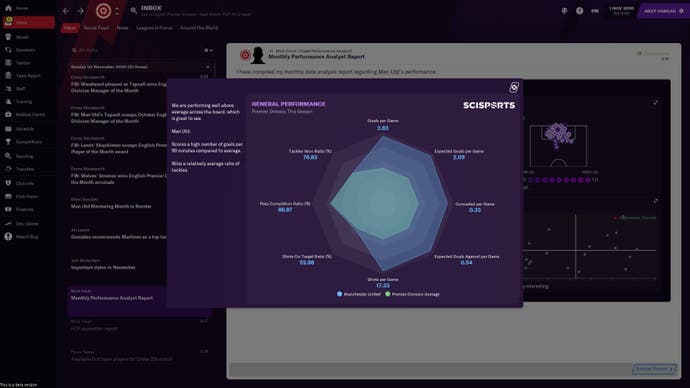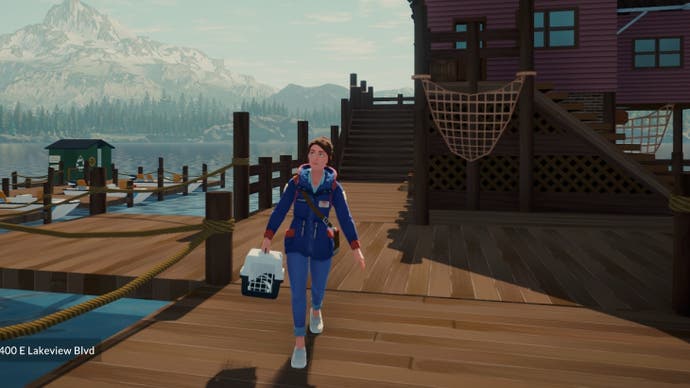What we've been playing
A few of the games that have us hooked at the moment.
25th of June, 2021
Hello! Welcome back to our regular feature where we write a little bit about some of the games we've found ourselves playing over the last few days. This time: Football, retro gems, and a postal delivery route.
If you fancy catching up on some of the older editions of What we've been playing, here's our archive.
Football Manager, PC

I've been playing FM21, on and off, since it came out last year, but as someone who can only get joy out of the "righting the wrongs of the club you support in the real world" style of Football Manager, I often reach a sort of terminal velocity around this time of year. I'm three-plus seasons in, I've won everything, tinkered the squad to near perfection, and now it's just about beating Liverpool and/or PSG in a couple of key matches a year.
But! The Euros are on, and the transfer window is open, which means it's Football Manager season once again. Rather than simming the tournament as perennially hot-and-cold England, though, what's got me this time is something much more reliable, much sexier: data. Football is changing, quite rapidly - or maybe the right way to put this is football has already changed, and the way people talk about football is catching up. Data science, analytics, numbers, stuff from experts - the stuff the traditional football fan is programmed to loathe - are seeping into the conversation.
Every now and then Sky Sports will put xG on their little stats screen (xG is expected goals - a fancy-sounding but actually quite simple number that indicates how likely a shot is to lead to a goal, down to a couple of decimal places, basically putting a figure on how "big" a chance is). People are talking about the midfield "pivot", how many "duels" a player has won, how good a player is at "ball progression". It can quickly descend into jargon but the point is, we're starting to talk about footballers as they actually are: elite athletes with huge teams of scientists supporting them behind the scenes. Football Manager gets this, and like the odd broadcaster or publication it's beginning to trickle in the data science to help back up your intuition - which is why I've been sucked back into playing it. There might only be a couple of matches a year that truly matter in my save now - but I've got a whole season of data to help me win them, and a team of experts behind the scenes.
Chris Tapsell
Alex Kidd in Miracle World DX, Switch
I suspect I played Alex Kidd before I ever played Mario. We were a Master System school, and Alex Kidd in Miracle World was the game that came with the machine. Literally inside the machine, that is - if you didn't plug in a cartridge, you got Alex Kidd on your TV.
And because of that, this game has always seemed extra special to me - an additional treat, a thing of boundless opportunity. Recently Miracle World got the Wonder Boy 3 treatment, with a lovely update that adds new art but allows you to switch back to the original whenever you want. It's not as skilful and coherent as the recent Dragon's Trap reimagining - what is, of course? That game is a total delight - but it's still lovely to be replaying the old levels and thinking about things it feels like I haven't thought about in over thirty years.
One thing that charms me at the moment is the underwater levels. I'd forgotten how much the water wants to drag you back to the surface, making punching that frog guy to pieces in an early stage all the harder. Alex Kidd is like this, I think: a bunch of lovely old memories coming at me one after another. Joy!
Chris Donlan
Lake, Xbox
Soothing gameplay and a 'return to your hometown' narrative mesh surprisingly well in Lake, a small town postie simulator set in the 1980s. Its demo, which you can try now on Xbox and Steam, offers a generous chunk of story, and by the end of it I was eager to see where things would head next. You play as Meredith Weiss, a high-flying city worker who takes a working holiday back in her hometown to deliver its post - a job normally performed by her vacationing father.
The daily routine of driving round town, handing over parcels and poking letters into mailboxes, acts as a steady rhythm for the game. Your visits to local homes and businesses offer chances to connect with the lakeside town's inhabitants, or reconnect with old faces from your youth. You can choose to help people with their problems alongside strictly sticking to the mail - delivering a sick cat to someone else who can help, for example - and strike up conversations which seem like they'll open up into romances. And then, every evening, you'll get a call from your boss back in the city who doesn't understand you're on holiday.
Lake is still a little rough around the edges, but there's time for these to be smoothed over ahead of its full release in September. And in terms of a mechanic for its storytelling, this sleepy retro delivery sim offers something already first class.
Tom Phillips



